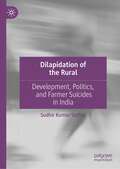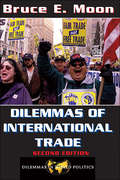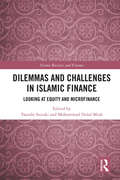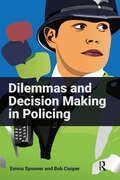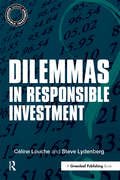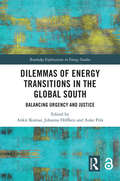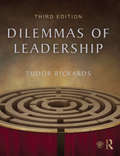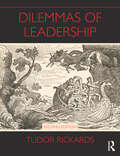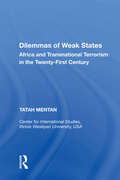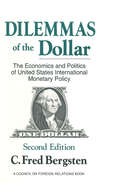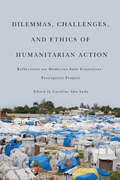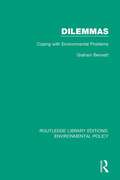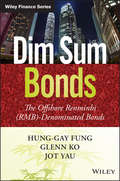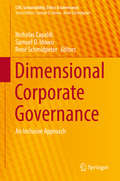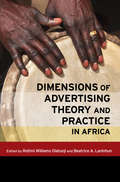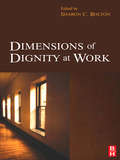- Table View
- List View
Dilapidation of the Rural: Development, Politics, and Farmer Suicides in India
by Sudhir Kumar SutharThis book explains farmer suicides in India in the backdrop of rural politics as a determining factor. By bringing in politics as a variable the research presented in the book reveals that there are non-farm factors playing critical role in prompting behavioral change amongst the peasantry but haven’t received much academic attention. The book argues that the changing nature of public spaces has significantly altered the perception of self in the rural society of India. It presents indicators of this rural change and how the state policy and political parties led political mobilization that changed the character of community relations in the rural areas. The book shows that other possible manifestations of the large-scale behavioral change in the rural areas and increasing rural distress, those are equally serious but haven’t received much attention, are rising cases of drug-addiction, agrarian riots, or other forms of collective violence. The increasing number of farmers protests also need to be understood in this context.
Dilemas con los que nos enfrentamos en el mundo de los negocios
by Maria J. Manzano Dr Rosie KuhnDescripción del libro: Realmente todos nosotros somos personas extraordinarias. Todos nosotros poseemos la capacidad para ir más allá de nuestra actual forma de pensar si nos sumergimos en los dilemas del día a día donde un gran potencial de nuestro YO permanece oculto a la espera de que lo descubramos y de que utilicemos los dones que no explotamos. Usted tiene esta capacidad. Le está esperando. Si usted está preparado para este viaje este libro le puede interesar. Dilemas con los que nos enfrentamos en el mundo de los negocios habla sobre personas extraordinarias que se enfrentan a desafíos que les ponen obstáculos en el camino tal y como nos ocurre a nosotros, "la gente normal y corriente". La diferencia es que cuando las personas que aparecen en estos relatos se encuentran con obstáculos, traspasan y exploran de forma voluntaria los límites de la razón de su paradigma actual. Cada vez que surge un dilema deciden enfrentarse cara a cara con los demonios personales que aparecen y que les permiten ver las cosas de forma diferente. Hacen esto para realizar sus proyectos de forma plena. Esto no significa que no tengan miedo y que sean tremendamente valientes, significa que están comprometidos y que tienen fe en sí mismos y que las expectativas en la vida que ellos imaginan superan sus miedos. Las personas extraordinarias tienen una tremenda curiosidad por saber lo que hay más allá del letrero: "¡PELIGRO: NO TRASPASAR!". Voluntariamente amplían su repertorio y su capacidad para tomar decisiones de forma diferente cuando se enfrentan con CALLEJONES SIN SALIDA y TERRITORIOS DESCONOCIDOS. Comprenden plenamente que hay una sabiduría más allá de su propio conocimiento que les guía y aconseja para alcanzar un estilo de liderazgo más expansivo y eficiente. Puede que estén asustados, tal como nos ocurre a nosotros, sin embargo, actúan ignorando esos miedos. Realmente todos nosotros somos personas extraordinarias
Dilemas de Estar nos Negócios
by Dr Rosie KuhnA verdade é que cada um de nós é extraordinário. Cada um de nós possui a capacidade de se expandir para além do nosso pensamento atual, mergulhando em dilemas diários onde um vasto recurso do Eu está adormecido, à espera de ser descoberto e de utilizar plenamente o brilhantismo inexplorado. Você tem essa capacidade. Está à espera da sua chegada. Se você está pronto para tal expedição, este livro é para si. Dilemas de Estar no Mundo dos Negócios tem a ver com pessoas extraordinárias a enfrentarem desafios comuns, a serem atropeladas e impedidas por eles, tal como nós, "gente comum". A diferença é que, quando as pessoas nestas histórias são confrontadas ou impedidas, elas penetram e exploram de bom grado o limite da razão do seu paradigma atual. Em cada dilema que surge, elas escolhem ficar frente a frente com demônios pessoais que surgem, e permitem-se ver as coisas de maneira diferente. Elas fazem isso para que as suas intenções se realizem plenamente. Não é que elas sejam destemidas e corajosas além da medida; é que o seu compromisso e crença em si mesmas e na sua visão de vida supera o seu medo. As pessoas extraordinárias estão profundamente curiosas sobre o que está para além da sinalização - as que leem: “PERIGO: NÃO ENTRAR!” Expandem voluntariamente o seu repertório e a sua capacidade de escolha de forma diferente quando confrontados com BECOS SEM SAÍDA e TERRITÓRIOS DESCONHECIDOS. Compreendem perfeitamente que existe uma sabedoria para além dos seus próprios conhecimentos que os orienta e os auxilia numa liderança mais expansiva e eficaz. Podem estar assustados, tal como nós; no entanto, são movidos a agir, independentemente dos seus receios.
Dilemmas Of International Trade
by Bruce E. MoonIn the post-Cold War world, trade is the new arena for competition-between nations, between groups, between ethical and theoretical ideas. In this revised and updated second edition of Dilemmas of Int
Dilemmas and Challenges in Islamic Finance: Looking at Equity and Microfinance (Islamic Business and Finance Series)
by Yasushi Suzuki Mohammad Dulal MiahThe phenomenal growth of Islamic finance in the last few decades has been accompanied by a host of interesting questions and challenges. One of the critical challenges is how Islamic financial institutions can be motivated to participate in the 'equity-like' profit-and-loss sharing (PLS) contracts. It is observed that Islamic banks are reluctant to participate in the pure PLS scheme which is manifested by the rising concentration of investment on murabaha or mark-up financing. This phenomenon has been the hotbed of academic criticism on the contemporary practice of Islamic banking. This book explains the 'murabaha syndrome' in light of the incentive provided by the current institutional framework and what are the changes required in the governance structure to mend this anomaly.
Dilemmas and Decision Making in Policing
by Emma Spooner Bob CooperExplores how policing students and police officers might apply theory to tackle dilemmas demonstrated through true to life scenarios.Relevant for those undertaking the Professional Policing degree, Apprenticeships or the Degree Holder Entry Programme, as well as their academic and work-based educators, it examines the complexities faced on a daily basis by frontline officers. A range of fictional realistic case studies are presented in order to highlight contemporary challenges in the modern policing landscape. These are unpicked through discussion and reflective questions, exploring how decisions are made based on theoretical understanding and practical considerations in context. Key themes within these scenarios include procedural justice, legitimacy, organisational culture, prioritisation of workload, objectivity and neutrality, human rights and values. The book provides students and their educators with the opportunities to discuss policing dilemmas and decision-making in a safe space.
Dilemmas in Responsible Investment (The Responsible Investment Series)
by Céline Louche Steve LydenbergImagine that you are a responsible investment money manager. One of your clients is asking you to sell her holdings in a company because it has been accused in the press of contracting with suppliers that have abusive labour conditions. You have to evaluate and benchmark the CSR performance of a number of companies from the same industry but among them there are companies, primarily the smallest, that provide little or no CSR information. One of your major clients is asking you to exclude companies involved in nanotechnology What would you do? Responsible investment (RI) – the integration of environmental, societal and governance (ESG) issues into investment decision-making – can be difficult and complex. Including or excluding companies, engaging with companies, partnering with stakeholders, evaluating environmental and societal controversies, defining criteria and, all the while, producing a competitive return for investors can raise multiple questions that cannot be dealt with simply. The practice of RI faces many such dilemmas as it seeks to balance the competing goals of business, society, and finance and to judge how best to reconcile what are often conflicting concerns. Dilemmas in Responsible Investment examines the problems responsible investment practitioners face daily. It emphasises the importance of asking the right questions as well as getting the right answers; and the importance of process as well as product. The authors pay attention to the diversity of opinion and variety of approaches available. They also raise fundamental questions about the very purpose of investment and the responsibilities of investors, both economic and societal. Although dilemmas in RI are not always easily resolved, Louche and Lydenberg believe that they are also a source of valuable and necessary debate about the appropriate role of corporations in society and the ability of the financial markets to appropriately serve the societies in which they operate. Such dilemmas provide a valuable framework for public debate and can encourage the emergence of innovative answers and approaches. Responsible investors join in these debates when they examine the societal and environmental implications of business activities, actions and behaviour Facilitate dialogue between corporations and their stakeholders Encourage corporate transparency on societal and environmental issues Reward companies that are making genuine efforts towards sustainability Integrate societal and environmental data into financial analysis. The book first of all provides a state-of-the-art overview of responsible investment, its history and development, explanations of key terms and a guide to the different actors involved in the field. Second, it presents 12 diverse hypothetical case studies that examine a wide spectrum of the challenges facing RI professionals, raising questions about the relationship between business and society, about the purpose of investment, and about the responsibilities of investors to various segments of society and the environment. The (often interconnected) cases present a dilemma, possible approaches available, variable factors, a variety of quotations and suggested responses from 35 leading professionals in the responsible investment community, real-world examples and comparisons and recommendations. Accessible, vivid and illuminating, Dilemmas in Responsible Investment is the first book specifically written for teaching and professional training in responsible investment. It will be required reading for students, academics and practitioners in the areas of finance, ethics and CSR.
Dilemmas of Energy Transitions in the Global South: Balancing Urgency and Justice (Routledge Explorations in Energy Studies)
by Ankit Kumar, Johanna Höffken and Auke PolsThis book explores how, in the wake of the Anthropocene, the growing call for urgent decarbonisation and accelerated energy transitions might have unintended consequences for energy poverty, justice and democracy, especially in the global South. Dilemmas of Energy Transitions in the Global South brings together theoretical and empirical contributions focused on rethinking energy transitions conceptually from and for the global South, and highlights issues of justice and inclusivity. It argues that while urgency is critical for energy transitions in a climate-changed world, we must be wary of conflating goals and processes, and enquire what urgency means for due process. Drawing from a range of authors with expertise spanning environmental justice, design theory, ethics of technology, conflict and gender, it examines case studies from countries including Bolivia, Sri Lanka, India, The Gambia and Lebanon in order to expand our understanding of what energy transitions are, and how just energy transitions can be done in different parts of the world. Overall, driven by a postcolonial and decolonial sensibility, this book brings to the fore new concepts and ideas to help balance the demands of justice and urgency, to flag relevant but often overlooked issues, and to provide new pathways forward. This volume will be of great interest to students and scholars of energy transitions, environmental justice, climate change and developing countries.
Dilemmas of Innovation: A Summary
by Clayton M. ChristensenThe chapter summarizes, at a very high level, why and how new capabilities must be developed in organizations faced with rapid technological change. Though the vast majority of innovation challenges companies will face are sustaining in nature, some are disruptive--and successfully addressing those will require different skills, approaches, and strategies. This chapter was originally published as chapter 11 of "The Innovator's Dilemma: When New Technologies Cause Great Firms to Fail."
Dilemmas of Leadership
by Tudor RickardsLeadership, as a way of focusing and motivating a group or organization to achieve its aims, is a much discussed but often misunderstood concept. This comprehensive textbook introduces the subject for Masters level students. Building on the success of the first edition, this text utilises an easy to follow, map-based approach to take the reader on a journey through the various fundamental dilemmas apparent within leadership studies, dilemmas such as: Is a leader born or made? How are tensions between ethical dilemmas and economic self-interest resolved? How does a leader's desire for control balance with the need to empower members of the organization? Student-friendly features new to this edition include a wealth of leadership cases, videos and web-based content regularly updated, so that the book can be studied in the context of the most pressing contemporary leadership issues.
Dilemmas of Leadership
by Tudor RickardsLeadership, as a way of focusing and motivating a group or organization to achieve its aims, is a much discussed but often misunderstood concept. This comprehensive textbook introduces the subject for Masters level students. Building on the success of the first edition, this text utilises an easy to follow, map-based approach to take the reader on a journey through the various fundamental dilemmas apparent within leadership studies, dilemmas such as: Is a leader born or made? How are tensions between ethical dilemmas and economic self-interest resolved? How does a leader's desire for control balance with the need to empower members of the organization? Student-friendly features new to this edition include a wealth of leadership cases, videos and web-based content regularly updated, so that the book can be studied in the context of the most pressing contemporary leadership issues.
Dilemmas of Weak States: Africa and Transnational Terrorism in the Twenty-First Century (Contemporary Perspectives On Developing Societies Ser.)
by Tatah MentanGiven the dramatic changes that have taken place in global politics in recent years (especially following September 11, 2001), it is time to examine a series of critical issues confronting the global political economy. One of the most important of these issues is terrorism and its relationship with weak states. This book examines the weak state-terrorism nexus with particular emphasis on Africa. Specifically, it provides an in-depth analysis of state weakness, poverty, and the opportunities offered by the latter for the breeding of terrorism and terrorists. It also looks at the part played by radical Islam in transnational terrorism in Africa. Emerging from this study is recognition of a need for the international system to analyze a wide range of issues that contribute to the weakening of African states.
Dilemmas of the Dollar: Economics and Politics of United States International Monetary Policy
by C. Fred BergstenAn examination of the role of the dollar in the global financial system which presents a long-term historical perspective on the international monetary system in this century. The main focus is on the evaluation of the global financial system in the post-war period.
Dilemmas, Challenges, and Ethics of Humanitarian Action
by Caroline Abu-SadaWhat are the ethical issues involved in providing humanitarian aid? What is the real impact of humanitarian groups? Médecins Sans Frontières sought to answer these questions in the Perception Project, a study that spanned four years and more than ten countries. MSF interviewed close to 7,000 people in order to understand the ways that patients, populations, authorities, and communities perceive the Nobel Peace Prize-winning organization's principles and medical practices. While the quality of its medical action is renowned and praised, MSF struggles with the ability to respond to crises, the safety of its teams, and the development of effective interactions with diverse populations and authorities. Dilemmas, Challenges, and Ethics of Humanitarian Action is a series of reflections on the Perception Project that presents the insights and analyses of authors from a diverse array of fields including communications, ethics, medicine, humanitarian studies, and political science. At a time when humanitarian aid is under increasing scrutiny, this book provides insiders' perspectives on how one of largest and most influential non-governmental medical organizations can better serve those in need. Contributors include Caroline Abu-Sada (MSF Switzerland), Naomi Adelson (York University) Donald C. Cole (University of Toronto), François Cooren (Université de Montréal), Sonya De Laat (McMaster University), Laurie Elit (McMaster University), Larissa Fast (University of Notre-Dame), Matthew Hunt ( McGill University), Kirsten Johnson (McGill University), Khurshida Mambetova (Former MSF Canada), Frédéric Matte (Université de Montréal), John D. Pringle (University of Toronto), Lynda Redwood-Campbell (McMaster University), Lisa Schwartz (University of McMaster), Chris Sinding (McMaster), Jennifer Ranford (University of Waterloo), Peter Walker (Feinstein International Center, Tufts University).
Dilemmas, Challenges, and Ethics of Humanitarian Action: Reflections on Médecins Sans Frontières' Perception Project
by Caroline Abu-SadaWhat are the ethical issues involved in providing humanitarian aid? What is the real impact of humanitarian groups? Médecins Sans Frontières sought to answer these questions in the Perception Project, a study that spanned four years and more than ten countries. MSF interviewed close to 7,000 people in order to understand the ways that patients, populations, authorities, and communities perceive the Nobel Peace Prize-winning organization's principles and medical practices. While the quality of its medical action is renowned and praised, MSF struggles with the ability to respond to crises, the safety of its teams, and the development of effective interactions with diverse populations and authorities. Dilemmas, Challenges, and Ethics of Humanitarian Action is a series of reflections on the Perception Project that presents the insights and analyses of authors from a diverse array of fields including communications, ethics, medicine, humanitarian studies, and political science. At a time when humanitarian aid is under increasing scrutiny, this book provides insiders' perspectives on how one of largest and most influential non-governmental medical organizations can better serve those in need. Contributors include Caroline Abu-Sada (MSF Switzerland), Naomi Adelson (York University) Donald C. Cole (University of Toronto), François Cooren (Université de Montréal), Sonya De Laat (McMaster University), Laurie Elit (McMaster University), Larissa Fast (University of Notre-Dame), Matthew Hunt ( McGill University), Kirsten Johnson (McGill University), Khurshida Mambetova (Former MSF Canada), Frédéric Matte (Université de Montréal), John D. Pringle (University of Toronto), Lynda Redwood-Campbell (McMaster University), Lisa Schwartz (University of McMaster), Chris Sinding (McMaster), Jennifer Ranford (University of Waterloo), Peter Walker (Feinstein International Center, Tufts University).
Dilemmas: Coping with Environmental Problems (Routledge Library Editions: Environmental Policy #3)
by Graham BennettFirst published in 1992. Why are environmental problems, problems? Usually, says Graham Bennett. because the interests of the polluter are incompatible with the preservation of the environment. A hunter of whales, no matter how concerned about their decline, will always need to kill again, and a government, no matter how worried about the effects of its polluting industry, will still fight to keep it going. In this fascinating book the author takes six examples as far apart as the Rhine and the Arctic, as Tennessee and the Gulf of Genoa, to illustrate his point. In doing so he shows up the dilemmas facing those who are fighting to improve matters. He demonstrates the degree of duplicity exercised by those in power in order to preserve their interests, but he also shows how often environmental problems emerge simply because of muddle. These riveting stories describe not just the well-known effects of pollution or environmental destruction, but the ways in which the problems arise and the circumstances and complexity of the questions to be resolved. Whatever the concern - the preservation of the Bowhead Whale, or dumping salt in the Rhine - this book is a must for every environmentalist.
Dilemmes dans le monde des affaires
by Dr Rosie KuhnLa réalité est que chacun de nous est unique et extraordinaire. Nous avons tous en nous la capacité de dépasser nos façons de penser habituelles en nous confrontant aux défis quotidiens. Ces défis cachent un potentiel immense, une richesse intérieure qui sommeille, prête à être explorée et pleinement mise en lumière. Vous possédez ce potentiel. Il n’attend que vous pour se révéler. Si vous êtes prêt à entreprendre une telle aventure, ce livre est fait pour vous. "Dilemmes dans le monde des affaires" raconte l’histoire de personnes exceptionnelles qui font face à des problèmes apparemment banals et se retrouvent, comme chacun de nous, parfois déconcertées ou bloquées. Ce qui les distingue, c’est leur volonté de dépasser ces moments de doute en explorant les limites de leurs croyances et en remettant en question leur manière de voir le monde. À chaque difficulté, elles affrontent leurs peurs et ouvrent leur esprit à de nouvelles perspectives. Leur objectif : réaliser pleinement leurs intentions. Ce n’est pas qu’elles soient dénuées de peur ou dotées d’un courage sans limite, mais leur engagement envers elles-mêmes et leur vision de la vie l’emportent sur leurs craintes. Ces personnes extraordinaires éprouvent une curiosité profonde pour ce qui se trouve au-delà des barrières mentales qu’elles se sont imposées – ces barrières marquées par des avertissements comme : « DANGER : NE PAS FRANCHIR ! » Elles osent élargir leur champ d’action et explorer de nouvelles voies lorsqu’elles se heurtent à des IMPASSES ou s’aventurent dans des TERRITOIRES INCONNUS. Elles savent qu’une sagesse plus grande que leur propre expertise peut les guider vers un leadership plus ouvert et efficace. Elles ressentent la peur, comme nous tous, mais elles choisissent d’agir malgré tout. La vérité est que chacun de nous est extraordinaire. Nous avons tous la capacité d’aller au-delà de nos limit
Dim Sum Bonds
by Hung-Gay Fung Glenn Chi-Wo Ko Jot YauA comprehensive guide to understanding and assimilating into dim sum bond marketsThe expansive growth of the dim sum bond market in the last five years has peaked investor interest and inspired companies to seek out investing opportunities that negate China's capital controls. In a four-pronged approach, Dim Sum Bonds examines the development of the dim sum bond market and its role in China's RMB internationalization policy, characteristics of dim sum bonds and its market, investors' investment objectives and the investment performance of dim sum bonds, motivations of issuers, and underwriters' roles in the dim sum bond market. You will familiarize yourself with every aspect of the dim sum bond market from an issuer, an investor, and an underwriter's perspective. Academics, financial advisors, investment bankers, underwriters, investors, and policy makers should not be without this informative and detailed guide to the offshore market central to China's internationalization of RMB.Written by Hung-Gay Fung, Glenn Chi-Wo Ko, and Jot Yau, all of whom are experts on the dim sum bond marketExplains the rapidly expanding dim sum bond market and puts readers ahead of the curveLandmark issues, Chinese banks (China Development Bank), Infrastructure, red-chip companies (Sinotruk), and multinational corporations doing business in China (McDonald's) are discussed in detail.Covering landmark issues from a variety of Chinese and multinational corporations, Dim Sum Bonds provides must-read manual to understanding the vast opportunities of this up-and-coming market.
Dimensional Corporate Governance
by Nicholas Capaldi Samuel O. Idowu René SchmidpeterThis book explores different dimensions of the field of corporate governance and social responsibility. It discusses how business and society perceive and relate to CSR; how the field has continued to reshape modern corporate boardrooms in both the advanced and emerging economies; how CSR has transformed the manner in which modern corporate entities disclose the non-financial information aspect of their operations to the world at large; and the way in which sustainable development has continued to contribute to improving the quintuple bottom line - people, planet, prosperity, partnership and peace - of 21st century corporate entities. Further, the book also provides evidence of how these aspects of corporate social responsibility are depicted in different forms in eleven nations around the globe.
Dimensional Fund Advisors, 2002
by Randolph B. CohenDimensional Fund Advisors (DFA) is an investment management firm that prides itself on basing its investment strategies on sound academic research. Many of the best-known finance research papers of the past two decades (especially those by Eugene Fama and Kenneth French, who work closely with DFA) have led to DFA investment strategies. DFA began as a small-stock fund, attempting to take advantage of the "size affect" (excess performance of small stocks) that had been discovered by a number of academic researchers. Later, DFA added "value" strategies to its mix of offerings. After academic research documented superior performance by value stocks in a multitude of countries, DFA began to create a variety of international value-stock and small-stock investment funds. The company was highly successful, despite missing out on the great 1990s growth-stock boom. DFA's assets under management grew from $8 billion to $40 billion between 1991 and 2002. With value stocks having performed well in the first two years of the new decade, DFA is experiencing continued growth of its investor base and is now seeking new areas in which it can add value for investors while continuing to claim to have no special "stock-picking" ability.
Dimensional Fund Advisors--1993
by Jay O. LightA small California-based money manager is now offering specialty products for institutional investors based upon recent financial research findings.
Dimensions of Advertising Theory and Practice in Africa
by Ganiyu Olalekan Akashoro Sibongile Sindane Gilbert Motsaathebe Sydney Friendly Kankuzi Rotimi Williams Olatunji Shaibu Husseini Mariska Bertram Jacinta Mwende Maweu Sunday Adekunle Akinjogbin Nelson Okorie Chinenye Nwabueze Julius Abioye Adeyemo Beatrice Adeyinka Laninhun Nnamdi Tobechukwu Ekeanyanwu Assay Benjamin Enahoro Olujimi Kayode Seyi Soremekun Olayinka Egbokhare Angelique Van Niekerk Noeem Taiwo Thannyhis book brings together cutting-edge research by leading African communication and media theorists to provide a broad but detailed survey of the history and present state of the art of advertising in Africa. The book is a thought-provoking reminder of the variety of approaches to the study of marketing communication on a continent where advertising is often taken for granted. From indigenous African forms of advertising - by street criers, wall paintings, and even olfactory appeals - to the latest experiments in integrated marketing communication via the Internet, home videos, smartphones, and social media, Dimensions of Advertising Theory and Practice in Africa is a comprehensive survey both of Africa's contributions to the globalized advertising industry and of the industry's profound affect on African economies and cultures. The first collection of its kind, the book marks an important moment in the study of marketing communication in Africa. It will be an essential text for years to come.
Dimensions of Brand Equity for Nestle Crunch Bar, A Research Case
by Gerald ZaltmanAn in-depth study of consumer thoughts and feelings about a branded candy bar.
Dimensions of Change: Examining the Different Types and Approaches
by Harvard Business Review PressUnderstanding the types of change programs and approaches that organizations use is critical to managing a change initiative effectively. This chapter provides an overview of the different approaches and their effects on business performance.
Dimensions of Dignity at Work
by Sharon C. BoltonWhat is dignity in and at work? How is it experienced differently by different groups of working people?Are there enduring divisions of dignity: unequal access to what is accepted to be a fundamental human right?How can we ensure that continued opportunities are available for the creation, maintenance and restoration of dignity at work?This edited collection of papers investigates the concept of dignity and what it means to people in their working lives: how we are perceived and valued as people in the workplace.Contributors to over a century of social and organizational analysis have talked about dignity at work, but the discussion has tended to take place under headings such as citizenship, satisfaction, mutuality, pride in work, responsible autonomy and ontological security, or to focus on mismanagement, over-long hours, a poor working environment, workplace bullying and harassment as the central facilitator of indignity at work.Dignity in and at work is a far more complex phenomenon than these representations would suggest. Neither is it enough to suggest that equal opportunity, work life balance and anti-bullying policies restore dignity to work, valuable interventions though they are in themselves. The papers featured in this edited collection suggest that we see dignity reordered and experienced in different ways depending on our own circumstances and viewpoints.
